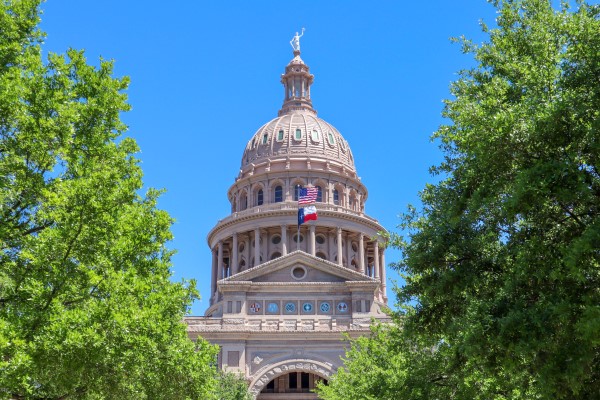Senator Alvarado and Representative Davis Discuss What's Ahead for 87th Legislative Session
Published Jun 08, 2020 by Julia McGowen
COVID-19 and the recent civil unrest brought by deep-rooted social injustices have underscored economic and societal issues plaguing communities across the world. While Houston is not immune to these issues, the region does have unique leadership in healthcare and diversity that could serve as a model for the nation as we begin to recover from the virus and work toward righting the institutions of our society that feed systemic racism. Meanwhile, the Texas Legislature is preparing to enter the 87th Legislative Session facing many unknowns.
In a moderated chat with Partnership Director of Public Policy Lindsay Munoz, State Senator Carol Alvarado of Senate District 6 and State Representative Sarah Davis of House District 134 joined the Partnership’s Future of Texas Business Resource Group to share insights on how the legislature is preparing to return to Austin in 2021.
On Issues of Racial Inequalities
Within the past few weeks, the nation has turned its focus to racial inequalities and injustice highlighted by the recent killings of George Floyd, Breonna Taylor and other African Americans. As millions across the country raise their voice and take action toward meaningful reform, invoking change also requires active participation from legislators at all levels of government. Senator Alvarado and Representative Davis both voiced how the Texas legislature has an important role to play in supporting sustainable action addressing racial discrimination.
Alvarado: Houston has played an important role in this issue. We have set an example of diversity within our local leadership with County Judge Lina Hidalgo, Mayor Sylvester Turner, Sheriff Ed Gonzalez, and Police Chief Art Acevedo, all of whom have demonstrated positive leadership for major metros. The legislature plays a role in addressing this issue and should work with our district’s police departments to offer more training on community policing, cultural diversity and human relations. Additionally, we should put more incentives in place for officers to get to know their communities, which decreases the likelihood of occurrences like the killing of George Floyd. Now more than ever we need leaders from the top down to offer solutions for our diverse neighbors.
Davis: The legislature is taking steps to find ways to address these issues, one being the newly formed criminal justice reform caucus, a bipartisan caucus in the Texas House which will examine what the State can do. In addition, we must take the time to personally listen to experiences of the black community and learn how we can be supportive on the issue. While I agree with protests, we need to remember that we are still in the middle of a pandemic and must gather responsibly.
On Supporting Small Businesses Amid Disaster
COVID-19 has put significant pressure on small businesses, causing hardship through shutdowns and phased reopening. While historic federal aid was passed to support small businesses through the crisis, these structures and financial aid have proved to be slow moving and present numerous barriers to access for small enterprises. Alvarado and Davis highlighted what small businesses in their districts have shared with them and how the legislature can act to help bridge short-term needs with long-term recovery.
Alvarado: Small businesses is what our economy thrives on and Houston is lucky to have a diverse pool of small businesses. Community banks have really stepped up to support our small businesses. We have seen that our smaller community banks have great relationships with the small businesses, and these established relationships help move processes of loans along faster. In the upcoming session, the legislature will have a responsibility to look at how we can prepare initiatives that support small businesses through future disaster. Keeping people employed is an important step in recovery so we must also look at programs that keep people on payrolls and attached to their job.
Davis: The Texas Workforce Commission (TWC) has been working nonstop, operating eight call centers seven days a week from 7 a.m. to 7 p.m. TWC has implemented innovating initiatives like the shared work program, which allows employers to reduce hours while still allowing the employee to receive unemployment benefits. The Paycheck Protection Program (PPP) is a prime example of how when you pass legislation, there are often unintended consequences. It is a step in the right direction that revisions are being implemented to the PPP to correct some of the issues. Many small businesses that have reached out to me in my district were in the restaurant industry, and they highlighted how PPP funds are not enough to support employees and rent payments because salaries for servers are mostly funded through tips. This highlights how disaster funding must be carefully considered across all industry applications.
On the 2021 State Budget
In preparation of the upcoming legislative session, Alvarado and Davis discussed how the 2021 budget, offered by Senate Finance Chair Jane Nelson as Senate Bill 1, will compare to the 2011 budget, which followed the last statewide recession.
Alvarado: Texas is grappling with many issues that are different than other states because of our global ties and dependence on the price of oil. While the pandemic is causing so many taxes to drop, we are also faced with overcoming issues in oil & gas that existed prior to the onset of COVID-19 and will have to be addressed as we prepare the budget and consider additional revenue streams. We also made a significant commitment to public education in House Bill 3 without a reliable mechanism to fund its initiatives, and we must look now at how we sustain it.
Davis: COVID-19 has called for the Texas Division of Emergency Management (TDEM) and the Texas Health and Human Services Commission (HHSC) to utilize significant funds to fight the pandemic that were not appropriated in the current budget, much of which will have to be drawn down from the economic stabilization fund (ESF), or more commonly called the “rainy day fund”. We expect the Comptroller Hegar to revise the revenue estimate in July, and we expect a billion dollar decrease to come from funds that had been appropriated but did not come in, putting a lot of pressure on the ESF. The comptroller’s May tax revenues show the lowest year to year drop since 2010, with all tax streams plummeting. We know further that there is going to be a slow recovery of taxes. Considering that oil & gas production tax is what funds the ESF and with the entire industry that employs so many, when this industry in turmoil, we know our budget will be in turmoil.
On the Budget Shortfall and Impacts of Rising Healthcare Costs
Alvarado and Davis addressed the fact that Texas must carefully consider how the region’s current economic status has exposed vulnerability in revenue streams, highlighting the crucial need for the state to create new revenue streams that service our long-term budgetary needs.
Alvarado: Last session, the Texas Senate started looking at new revenue streams. Some things on the table were increasing the cigarette tax and looking at different exemption categories, among others. Because we are so dependent on one segment of the economy, we need to write a new narrative, a new script moving forward, and we need to diversify our portfolio. The Texas economy cannot afford to be in a prolonged downturn. All of the gulf coast is impacted by this, but it is particularly highlighted in Harris County by the fact that unemployment numbers here outnumber all other counties in the state by nearly 2:1. We also have to dedicate money for our workforce, but we must focus on emerging industries that come out post-COVID and how we must prepare our workforce for those opportunities. There are five million uninsured in this state, when you layer on people that lost healthcare coverage because of the pandemic, and on top of that the health disparities and many other pandemic agitators, now is not the time to look at healthcare with partisan lenses - this impacts everyone.
Davis: Nothing is off the table. I will say I have found it interesting that legislators are focused on federal dollars coming from CARES Act, which come with strict guidelines and cannot be used to fill holes in the budget. There is hesitation about using CARES Act funds because they can be called back, so we need to be smart about where these federal funds provided by the CARES Act are used. As we look to the 2021 budget, we see a perfect storm brewing in healthcare, and if we want to talk about where to draw down federal dollars, this is a place to start. Medicare is an issue that has become so politicized, but it needs expansion. From a business perspective, this is an issue that the legislature must solve. With the 1115 waiver expiring in 2021, we are facing long term implications by not addressing issues within funding for our health care systems, which impacts our ability to attract businesses and a skilled workforce. Now is the time to have a substantive, specific discussion about the expansion of Medicaid.
Bookmark the Partnership’s COVID-19 Business Resource page for the latest updates and guidance.
 The Houston Report
The Houston Report


















